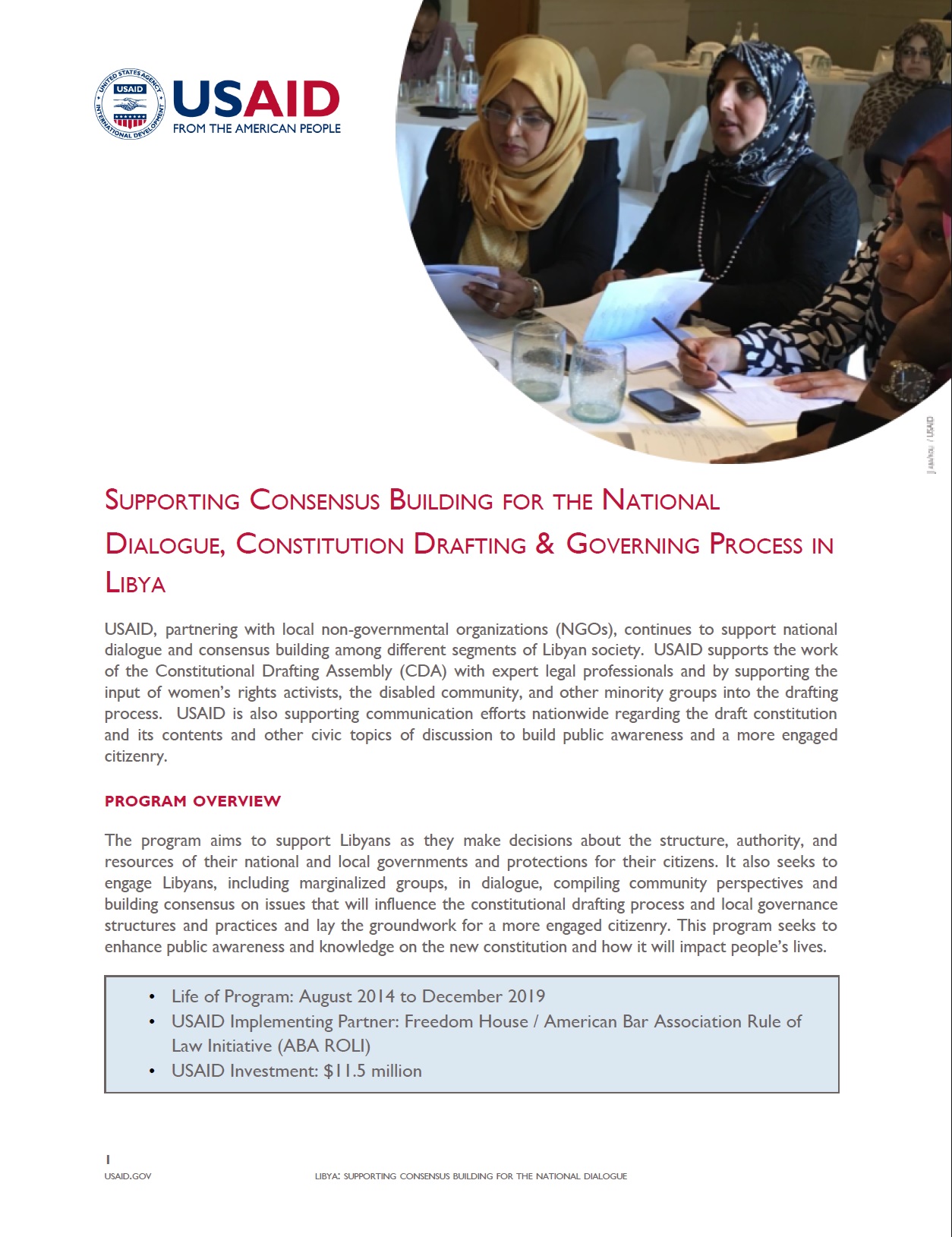Speeches Shim
SUPPORTING CONSENSUS BUILDING FOR THE NATIONAL DIALOGUE, CONSTITUTION DRAFTING & GOVERNING PROCESS IN LIBYA
USAID, partnering with local non-governmental organizations (NGOs), continues to support national dialogue and consensus building among different segments of Libyan society. USAID supports the work of the Constitutional Drafting Assembly (CDA) with expert legal professionals and by supporting the input of women’s rights activists, the disabled community, and other minority groups into the drafting process. USAID is also supporting communication efforts nationwide regarding the draft constitution and its contents and other civic topics of discussion to build public awareness and a more engaged citizenry.
Libya Consensus Building Activity (LCB) Factsheet ![]() (pdf - 477k)
(pdf - 477k)
PROGRAM OVERVIEW
The program aims to support Libyans as they make decisions about the structure, authority, and resources of their national and local governments and protections for their citizens. It also seeks to engage Libyans, including marginalized groups, in dialogue, compiling community perspectives and building consensus on issues that will influence the constitutional drafting process and local governance structures and practices and lay the groundwork for a more engaged citizenry. This program seeks to enhance public awareness and knowledge on the new constitution and how it will impact people’s lives.
- Life of Program: August 2014 to December 2019
- USAID Implementing Partner: Freedom House / American Bar Association Rule of Law Initiative (ABA ROLI)
- USAID Investment: $11.5 million
PROGRAM ACTIVITIES
- Support a network of Libyan experts and community liaisons to hold public community dialogue sessions on key constitutional issues to raise public understanding and develop citizen-driven recommendations for the Constitution Drafting Assembly (CDA) on topics such as: decentralization, the judiciary, gender issues, youth, and the system of governance.
- Enable civil society organizations to conduct public outreach and employ social and mass media to increase public awareness about the importance of peaceful dialogue, the role of the constitution, and other key governance issues impacting the lives of Libyan citizens.
- Enhance the capacity of CDA members to conduct public outreach on the constitution development process using media, developing informational materials, and facilitating roundtables and dialogue with key stakeholders and institutional partners.
- Build the capacity of legal offices at the Ministry of Local Government (MoLG) and local municipal councils to more effectively respond to citizen needs.
- Conduct a judicial baseline assessment, outline justice sector reform priorities, and offer technical assistance to the Ministry of Justice and Supreme Judicial Council to promote judicial efficiency, accountability, independence, and effectiveness.
PROGRAM ACHIEVEMENTS
- Supported more than 200 community dialogue/civic education sessions since late 2015 in 35 communities, which bring together community members, local council members, legal professionals, and government officials to discuss the constitution and governance issues.
- Supported 63 community liaisons, and created a network of 25 Youth Community Liaisons to conduct local dialogues on issues related to civic engagement and participation.
- Supported the CDA in creating its first public outreach strategy to raise awareness about the constitution, reaching at least two million Libyan citizens, since October 2016.
- Launched a national media campaign promoting civic engagement and fight against hate speech, through partner CSOs and local artists, using national TV, radio channels, and social media.
- Prepared recommendations for future legal reform and targeted programming to ensure the rights of minorities in Libya based on a comprehensive assessment with focus groups and key informant interviews.
- Trained legal officers of the MoLG on legislative drafting and analysis, including skills necessary to draft regulations on municipal revenue generation.
- Completed a judicial baseline assessment outlining reform priorities for the justice sector on topics such as: judicial management, prosecution services, court administration and access to justice, judicial education, and detention procedures.


Comment
Make a general inquiry or suggest an improvement.